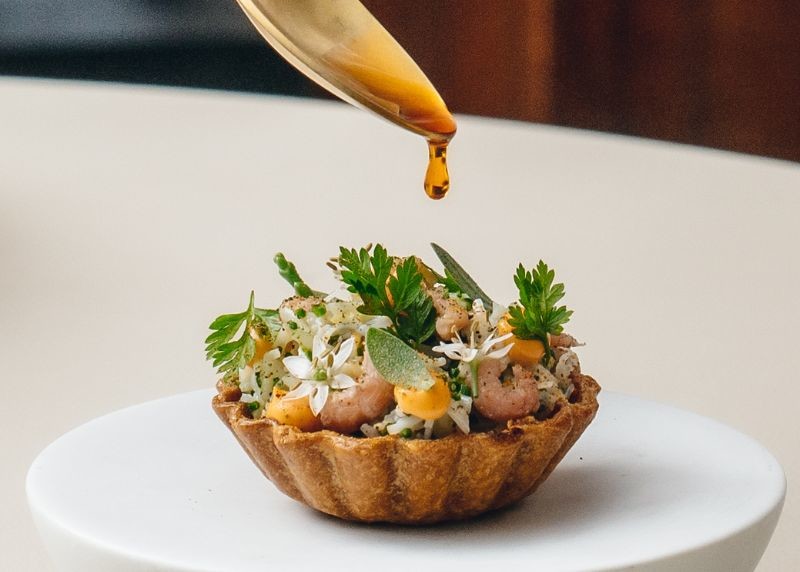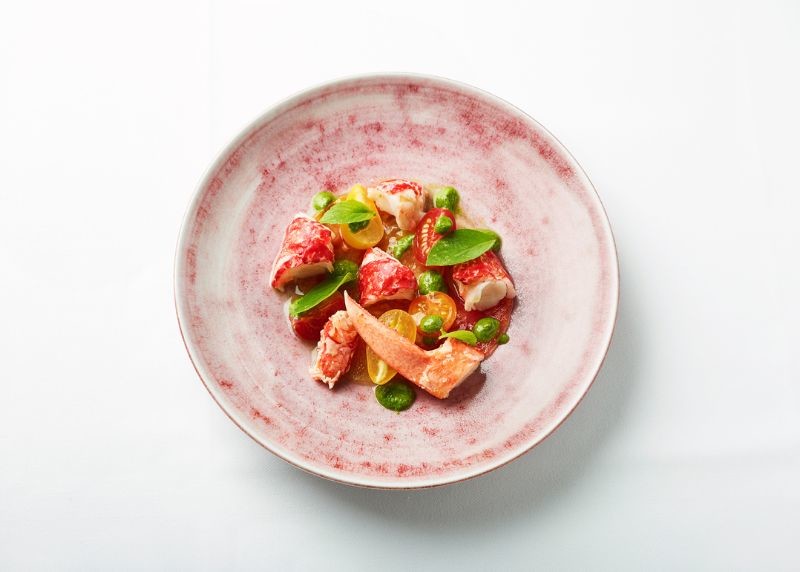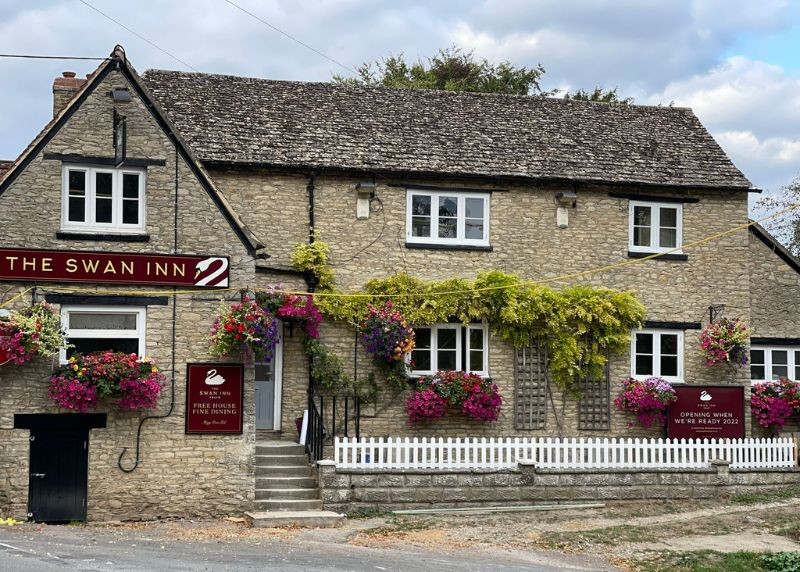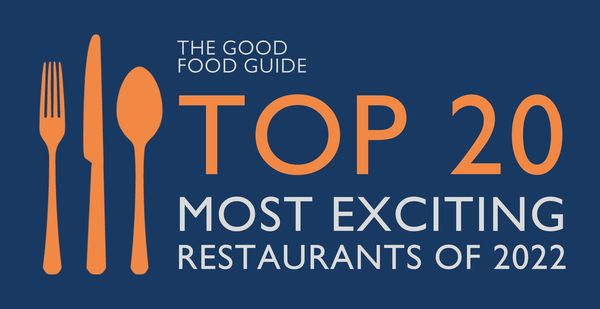The questions swirling around chefs’ and restaurateurs’ minds in these complex, expensive, staff-less times, must be exhausting. Getting the menu format right for the restaurant is a key part of the puzzle.
‘You want to stay true to yourself but relatable and accessible for guests,’ says Chris McClurg, chef patron at Paul Ainsworth at No. 6 in Padstow. ‘Sometimes there’s a conflict between being accessible, and cooking the food and menu style that you love.’ The easiest way right now, he argues, would be to offer one menu, no choice. ‘But that’s just not us.’

He and the team are a few weeks into a ‘subtle evolution’ from the post-Covid four-course menu with choices offered at No6. The £145 menu (roughly nine courses) offers choice at certain points, and interaction at others. A tartlet can be either be Land & River (crapaudine beetroot and smoked eel) or Land & Sea (kohlrabi and raw bass), and there’s theatre around set pieces such as the ‘Staub’ course, currently monkfish with salsa verde purée and a roast chicken and manzanilla sherry sauce. ‘The fish is roasted in butter and rested over smouldering gorse,’ says Chris. ‘It's brought to the table in a Staub cocotte and composed in front of guests. We couldn’t do that with an a la carte because on a table of four potentially you’d have four different dishes.’ The format makes dinner fun and pacy, and ‘hits the sweet spot’ on length – dinner takes about 2.5 hours. ‘We’ve had resoundingly positive feedback. People want some choice, but they also don’t want to have to think too much.’
Not far away in Port Isaac is Nathan Outlaw whose two restaurants – Outlaw’s New Road and Outlaw’s Fish Kitchen – offer evening tasting menus (£175 and £88 respectively). It works, he says, because guests come precisely for the Outlaw’s seafood experience, and he can manage costs and staff. But he expects typical tasting menus will evolve: ‘Customers want us to show off but also be flexible. For tasting menus to be viable they will have to offer an element of choice.’ Nathan changes dishes as frequently as the Cornish fishermen’s catches require – that’s the nature of his restaurant – but is looking forward to balancing his tasting menu with a new lunchtime a la carte. The menu, bookable from March 30th, will include the chef’s favourite dishes from the past two decades to mark 20 years since he opened his first Cornish restaurant, The Black Pig. ‘It’s also a way of showing my chefs and front of house staff something different.’

That’s important. Tasting menus can be limiting, he says, making chefs ‘complacent quite quickly’ and leaving front of house staff unmotivated. ‘Unless you have real characters on the floor, it can quickly feel like they’re talking from a script.’ As Chris says, keeping the team stimulated is crucial for the guest experience. ‘Look after the team and they will naturally look after the guests. Positivity breeds positivity.’
For Stu Deeley at Smoke (Hampton Manor, near Solihull) the answer is more akin to an a la carte: four courses with four choices at each stage but for a fixed price of £80 (or £100 for a ‘blind five’ tasting menu). It eliminates risk, he says. ‘It’s so hard to run a restaurant. You have to stay thrifty, keep the ordering tight, stay in tune with demand. It’s not a ‘finger in the air’ approach.’ Experience tells him what’s going to sell, and he wants to keep the appeal broad. ‘We’re a neighbourhood restaurant. We want to be a special occasion place but also somewhere for a Tuesday night dinner.’ And it keeps him stimulated as a chef: ‘I’ve worked in restaurants with tasting menus and that’s not why I became a chef. I wanted the excitement of service, the buzz, the fear. I don’t want to be counting out 72 pieces of carrot.’
It’s a similar story at Cygnet at The Swan Inn, Islip where Paul Welburn offers a four-course dinner for £60 and encourages guests to choose the vegetarian or non-vegetarian savoury dishes, with dessert remaining the same. ‘Fixing the price but not making it too high is the balance we’re trying to find. The four-course is a nice bridge between tasting and a la carte; we can change it regularly, and I can stay true to my style of food.’ He’s tackling the lunchtime challenge with a new menu that he hopes will attract village custom – £25 for two courses with glass of wine – running it alongside the existing 2-2-2 lunch menu.

‘Everyone’s got to believe in what they do,’ Paul says. ‘If you start to chisel away at your style, you lose your identity and that’s a confusing message.’ Chris McClurg agrees, arguing that holding fast to values is vital: ‘I was on a fairly intense management course recently and the most poignant phrase I took away was ‘culture eats strategy for breakfast’. That really resonated. As long as our core values and culture are strong, which they are, the rest falls into place.’ He adds: ‘I don’t think a la carte is dead by any means. Long live places like Quo Vadis and Noble Rot who have the confidence and are not chopping and changing in uncertain times. We’re sure of our path too.’
It’s a confident approach that chimes with Gareth Ward. For the chef – and the diners who make nothing short of a pilgrimage to eat at Ynyshir in west Wales – a 30-bite £350 tasting menu is right. ‘Whatever you do there’s a customer for it,’ says Gareth. ‘High-end a la carte, low-end a la carte, MacDonalds, whatever.
‘I want to give you the most unbelievable experience. I want you to taste 100 different things, some of the best ingredients from around the world. And as a chef I want to cook with some of the best ingredients, and push myself.’ He is uncompromising. ‘When I worked for Sat [Bains, Restaurant Sat Bains, Nottingham] I remember he said you’ve got to be aggressive in difficult times. You’ve got to build, learn, develop, keep doing what you love, so you’re ready when you come out the other end. Because you always do, it’s a cycle. That was a great piece of business advice. I will never forget it.’
Hear more from Britain's best chefs in The Good Food Guide Weekly




